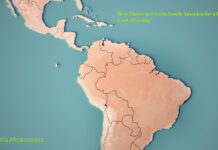Welcome to this post on how to move to Canada in 2 months, via Afrokonnect. Imagine starting a new life in the beautiful landscapes of Canada which houses vibrant cities and diverse culture.
What if I told you that you could achieve your Canadian dream in just two months? Moving to Canada within such a tight timeframe may seem like such a daunting task but with strategic planning and determination, it is possible.
In this article, we will delve into the aspects of navigating the immigration process, securing employment, finding accommodation, and settling into your new life in Canada – all within two months.
So, if you’re ready to embark on this adventure filled with boundless opportunities, let us dive in and uncover the secrets to moving to Canada in just two months.
Research and Preparation (Week 1)
Canada boasts of a diverse range of immigration programs which are designed to attract skilled workers, entrepreneurs, students, and families from around the world. The most prominent are the:
a) Express Entry System: This system is a streamlined immigration process designed to manage applications for three federal economic immigration programs namely, the:
i) Federal Skilled Worker Program (FSWP)
ii) Federal Skilled Trades Program (FSTP)
iii) Canadian Experience Class (CEC).
For a candidate to be eligible for Express Entry, a number of factors have to be considered namely: Age, education, work experience, language proficiency (English and/or French), Etc.
Candidates who pass this requirements are fitted into a pool alongside others and are ranked based on their Comprehensive Ranking System (CRS) score. Candidates with the highest ranks are invited to apply for permanent residency through regular draws.
b) Provincial Nominee Programs (PNPs): This system involves the nomination of individuals by Canadian provinces and territories who meet specific criteria and possess skills/experiences that are high in demand within that jurisdiction.
Each Canadian province and territory operates its own set of PNP streams tailored to address their labor market needs and economic priorities. Eligibility for this program varies between provinces and territories.
It may also include factors such as education, work experience, language proficiency, job offers, and ties to the provinces.
c) Temporary Resident Visas: They include study & work permits, visitor visas, and provide individuals with temporary authorization to live, work, and study in Canada. They can also serve as pathways to building networks and exploring opportunities for future immigration.
Individuals should also utilize online resources and tools such as the Immigration, Refugees and Citizenship Canada (IRCC) website which provides information on immigration programs, policies, and procedures.
Gathering Documentation (Week 1-2)
The first step in gathering documentation is to create a comprehensive checklist of all required documents. The required documents needed may depend on the selected immigration program, the common ones include:
- Personal Identification: Valid passports, birth certificates, marriage certificates (if applicable), and other identity documents.
- Educational Credentials: Academic transcripts, diplomas, degrees.
- Work Experience
- Language Proficiency. E.g. IELTS, CELPIP, TEF.
- Financial Documentation
- Certificates of good conduct/ police clearance certificates
- Medical Examination Reports.
Despite careful planning, it is not uncommon for applicants to discover missing or incomplete documentation during the gathering process.
Hence, prompt action is essential to obtain any missing documents and prevent delays in the application process.
Submitting Application (Week 2-3)
Once the application forms are completed and all documents are gotten, applicants must ensure the submission of their application to the appropriate immigration authorities. The processes involved in submission involves:
- Applicants should ensure all information provided is accurate and consistent
- Payment of application fees
- Submission of the application either through a designated online portal, mail, or physically
Note: Candidates should ensure they retain a proof of submission. Following the submission of their application, applicants should ensure they monitor the status of their application and respond to requests from the immigration agency.
Biometrics and Medical Examination (Week 3-4)
Based on instructions from the immigration authorities, candidates should ensure that they schedule their biometrics appointments at designated Visa Application Centers (VACs) to provide fingerprints and photos for identity verification.
In addition, applicants must also undergo medical examinations conducted by approved physicians to access admissibility to Canada. These medical examinations include a physical examination, laboratory tests, and screening for communicable diseases.
Applicants should ensure that throughout the biometrics and medical examination process they ensure that all the necessary paperwork is submitted and processed within the specified timeframe to ensure a speedy immigration process.
Job Search and Preparation (Week 4-5)
By now, most applicants should be progressing steadily through the immigration process; hence, focus should shift by applicants to securing employment opportunities in Canada. This phase requires determination, and a strategic approach to effectively navigate the Canadian job market.
Note: Applicants can register with reputable recruitment agencies that specializes in their industry as this will aid in identifying suitable job opportunities, fine-tuning their resume, and preparing them for interviews.
By actively pursuing job opportunities, prospective immigrants can secure employment offers which will enable their establishment in the Canadian workforce.
Housing and Logistics (Week 5-6)
Here are steps to ensure you ensure suitable housing in your new environment:
- Research different neighborhoods to identify areas that align with your preferences.
- Ensure you consider some factors such as its proximity to school & work, amenities, safety, and access to public transportation.
- Explore housing options within your budget range.
- Submit rental applications promptly and include relevant documents such as proof of income, references, and credit reports.
- Ensure that you make logistical arrangements for transportation, utilities, and other essentials.
Financial Planning (Week 6-7)
1) Research the Cost of Living: Research the cost of living in your desired Canadian city including expenses such as housing, utilities, transportation, etc.
2) Create a budget for all anticipated expenses, i.e. fixed costs such as rent, utilities, etc.
3) Explore various options for transferring funds from overseas accounts and managing currency exchanges.
Consider using international money transfer services, banks, or online platforms to facilitate fund transfers securely and conveniently. This phase involves proactive management and informed decision-making to ensure financial stability during this “transition” period.
Travel Arrangements (Week 7-8)
Research various airlines to find the most convenient and cost-effective flights to Canada while considering various factors such as travel time and airline reputation. It is also important to make prior arrangements for transportation from the airport to the pre-arranged accommodation.
Settling In (Week 8)
After arrival, it is ensure to apply for a Social Insurance Number (SIN) as it is essential for employment, government benefits, and access to certain services. Some necessary activities needs to be carried out such as:
Some necessary activities needs to be carried out such as:
- Opening a bank account
- Exploring the locality to familiarize yourself with the environment.
- Connect with local immigrant settlement and community centers to access support services tailored to newcomers.
- Build a social network with your neighbors and fellow immigrants around you.
- Take advantage of government programs and online resources designed to assist newcomers.
Conclusion on How to move to Canada in 2 months
It is being a hectic 2 months hence I guess it’s time to congratulate you on your new home in Canada.
The journey of immigration is not just about relocating to a new country but about embracing new opportunities and building a brighter future for oneself and future generations. You will thrive in Canada but you must embody these qualities namely:
- Determination
- Resilience; and
- A spirit of oneness.
This embodies the values that define the Canadian identity and I wish you a successful stay in the Great White North (Canada). Thanks for reading and I hope to see you again on Afrokonnect.
















[…] Welcome to this post about Family Friendly Destinations and Activities in Canada, via Afrokonnect. Families of all sizes will love Canada’s abundance of adventure, culture, and scenic beauty, which spans from the sun-drenched cliffs of Nova Scotia to the majestic peaks of British Columbia. Everyone can have a memorable time in Canada’s expansive landscapes and energetic cities, regardless of whether they are travelling with toddlers, teenagers, or grandparents. Making plans for your upcoming family getaway? Prepare to fall in love with Canada’s most family-friendly vacation spots, where fun, nature, and creating memories all go hand in hand. You can read more on how to move to Canada in Two Months. […]